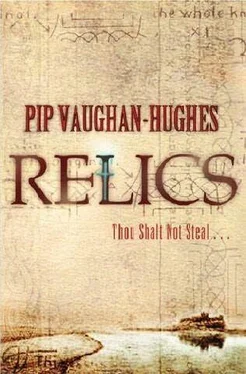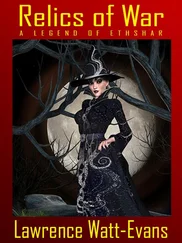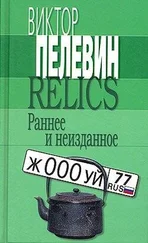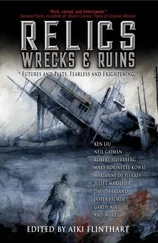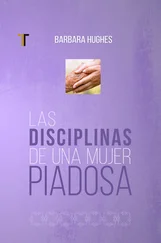Pip Vaughan-Hughes - Relics
Здесь есть возможность читать онлайн «Pip Vaughan-Hughes - Relics» весь текст электронной книги совершенно бесплатно (целиком полную версию без сокращений). В некоторых случаях можно слушать аудио, скачать через торрент в формате fb2 и присутствует краткое содержание. Жанр: Исторический детектив, на английском языке. Описание произведения, (предисловие) а так же отзывы посетителей доступны на портале библиотеки ЛибКат.
- Название:Relics
- Автор:
- Жанр:
- Год:неизвестен
- ISBN:нет данных
- Рейтинг книги:4 / 5. Голосов: 1
-
Избранное:Добавить в избранное
- Отзывы:
-
Ваша оценка:
- 80
- 1
- 2
- 3
- 4
- 5
Relics: краткое содержание, описание и аннотация
Предлагаем к чтению аннотацию, описание, краткое содержание или предисловие (зависит от того, что написал сам автор книги «Relics»). Если вы не нашли необходимую информацию о книге — напишите в комментариях, мы постараемся отыскать её.
Relics — читать онлайн бесплатно полную книгу (весь текст) целиком
Ниже представлен текст книги, разбитый по страницам. Система сохранения места последней прочитанной страницы, позволяет с удобством читать онлайн бесплатно книгу «Relics», без необходимости каждый раз заново искать на чём Вы остановились. Поставьте закладку, и сможете в любой момент перейти на страницу, на которой закончили чтение.
Интервал:
Закладка:
But I had but little time for poetry as the Cormaran creaked and lurched through the cold ocean. Sleep was impossible when the weather was evil, as it so often was, and when things were calmer, my exhaustion dropped me into a slumber that was only a little less deep and dark than death itself. When we left Iceland I had moved from my cosy berth in the bow, feeling that it set me apart, something I dearly wished to avoid. And now that nook was hidden behind a wall of sailcloth, home to the great bundles of whalebone, and furs that must be kept from the damp, Pavlos explained. The days passed in a fever of morbid anticipation, and the night watches were worse. With every jump over a wave-crest or swoop into the deep troughs between, the planking would groan like a thousand souls in purgatory, and I was certain the hull would burst apart and send us plummeting down through the green water. For me, the misery was made worse by Fafner's desertion. I rarely saw him now: he had found himself a cosy cave amongst the whalebone and fur, I supposed, for that was where his great tail would be vanishing those few times I caught sight of him.
We were avoiding Iceland this time. The danger from the King's revenue men was too great. Nizam had plotted a course that would drop us down the face of the world in a slow curve until we landed on the top of Ireland. A slow curve it sounded in his descriptions, but our progress, as marked obsessively on the Captain's charts (parchments that he gave more reverence to than any holy text I had ever encountered), seemed more like the weavings of a drunken spider: short leaps in one direction, crazy crabbing zigzags in another, but all the while, undeniably, edging us towards the south and east. We were bound for Dublin, and it seemed we were in some hurry to get there.
At last we caught a screeching gale from the west, and for endless days we flew on a broad reach, every man on deck for an eternity, working with frost-numbed hands. And then one day I felt a rope slacken in my grasp, and we all paused and looked aloft. The sail had relaxed, so slightly that I could have imagined it. A petrel whizzed past the crow's nest. Then the ship bucked again and the moment was past.
But the next morning I woke – suddenly, with no transition between sleep and absolute wakefulness, as I had begun to do lately – to see a washed-out blue sky above, some harmless-seeming clouds and a white bird. The wind had gone; we were tacking across a fresh southerly breeze, and soon the bird was joined by others, a wheeling, screeching party of gulls. Not petrels or the solitary albatrosses that had tracked us through the empty seas, but big seagulls like the ones that would swarm over the newly ploughed fields back home. The men began to smile and talk a little more easily, and in truth we had all been a little subdued of late. The relentless diet of puffin had taken its toll, and something else was weakening us. My mouth had swollen and my tongue with it. Eating was a chore, and if a piece of dry meat should slip between my teeth there would be agony and blood in worrying amounts. My legs were always stiff and they were becoming speckled with dark spots. Many of the others were spitting blood and complaining of swollen joints. Horst had lost two back teeth, and Zianni nearly choked on one of his that dropped out as he slept. And our breaths all had the same sour, tomb-like reek. 'It is the scorbutus,' said Isaac, but he could offer no cure. We must wait for dry land and another food than this cursed puffin,' he said, and we had to believe him. But indeed we could smell land in the warm breeze: wet earth, a ghost of something green. The ship seemed to wake from a long fever dream.
We were three days from Ireland. Our mad spider's course had brought us back to the Scottish isles, and that day we passed St Kilda, a tiny hermit's perch where countless gulls wheeled like bees around a hive. Nizam was aiming us at the North Channel, and Dublin – and some measure of civilization – had begun to occupy a large part of my waking mind. Streets, bustle, inns, beer! We talked of little else. Women, too, although that subject I tried to avoid as discreetly as I could. Will had often talked of the city whores he had enjoyed – to him such fleshly transactions were as natural as breathing. But the whores had scared me with their leering faces and heaving, sweat-streaked bosoms. There lay mortal sin, and of course I was also somewhat timid by nature.
Oddly, though, the only naked female bodies I had seen were in church, the painted ones in the hell that covered the west wall of Saints Sergius and Bacchus, a holy place much frequented by Balecester students. Here, women complete with round, turnip-like breasts, little bellies and black stains between their thighs were herded by serpentine devils who fondled them lewdly and prodded their heavy buttocks with eel spears. I had often lain awake in my mean little room in Ox Lane with those pale figures writhing before me, my own flesh rebelling from my control. I would try to focus on the devils, to imagine their spears stabbing at my own flesh, but those breasts and the dark patches below the bellies that sagged ever so gently… I would have to get out of bed and pray, kneeling until the hard floor hurt me enough to drive the foul visions away. Sometimes I would have to leave my room and wander the streets until dawn, saying my rosary and muttering to myself like, I daresay, a simpleton. It was on such a night that I had found the way onto the city walls.
Now, I supposed, I was no longer bound by the Church and its strictures, and the lewd and often frankly bizarre tales that seemingly every crewman now found time to share with me seemed, if anything, a little more terrifying because of the knowledge that I could now have such adventures of my own, should I so choose. Meanwhile my dreams grew lurid: patchworks of flesh, scraps and fragments of the day's talk. It was on the second morning past St Kilda that I awoke from the dream of a painful tangle of limbs (an Egyptian gypsy and her snake, courtesy of Zianni, had befriended Elia's Finnish twin sisters and an obese but talented Genoese, as described by Horst), to find that we were putting in to land. A long beach of white sand lay ahead, lying like spilled milk below crag-topped moors.
It was one of the Western Isles, lonely and uninhabited save for the wild sheep that grazed it, abandoned by settlers in time out of mind. There was a spring of sweet water above the beach, and we would fill our barrels here. Fresh water, and fresh mutton! The Cormaran preferred secrecy wherever possible, given the nature of its business. When we put into a populated harbour the traffic was one way: we brought our business to the land, and not the other way around. When it came to provisions and repairs, the Captain chose small, friendly villages or, even better, the privacy of a deserted shore. We were almost out of water, and although we had enough to bring us to Dublin, Gilles explained to me that the sharp and insatiable curiosity of the traders of that town was something to be deflected at all costs. And Guthlaf the carpenter was keen to repair a sprung plank and right some other ills inflicted by our dash across the Sea of Darkness.
The tide was half out, and Nizam ran the ship up into a shallow gulley carved out by the stream that ran down off the moors. It would hold the Cormaran while Guthlaf went about his work and let us float off again at high water. In an hour we were high and dry, and I was swarming over the side with the rest of the crew. It was high summer, I realised with a shock as my feet sank into the warm, wet sand. I could smell the heather, and knew that the moorland would be alive with bees storing up their wealth for the dead times. So, after I had helped fill the butts at a place where the stream poured over a granite lip and down onto the sand, and rolled them back to the ship, and spent a gentle hour gathering sea kale with Abu (how wonderful the thick, green stems felt to the touch, and even more wonderful was the sharp juice that stung my destroyed gums), I slipped away and, turning my back on the sea, set off to follow the stream up the hill towards the lowering crags. It led at first through a field of scattered boulders. The orange and grey lichens that clung to the rock were the same ones that grew in Devon, I noticed. The stream picked a narrow way through two great tumbled slabs, and beyond them lay a small, deep, sedge-rimmed pool fed at one end by a little waterfall that gurgled over a ledge thickly padded with moss. It reminded me of a pool I used to bathe in on the Red Brook near my home, and so without thinking I shed my clothes and slipped into the water.
Читать дальшеИнтервал:
Закладка:
Похожие книги на «Relics»
Представляем Вашему вниманию похожие книги на «Relics» списком для выбора. Мы отобрали схожую по названию и смыслу литературу в надежде предоставить читателям больше вариантов отыскать новые, интересные, ещё непрочитанные произведения.
Обсуждение, отзывы о книге «Relics» и просто собственные мнения читателей. Оставьте ваши комментарии, напишите, что Вы думаете о произведении, его смысле или главных героях. Укажите что конкретно понравилось, а что нет, и почему Вы так считаете.
